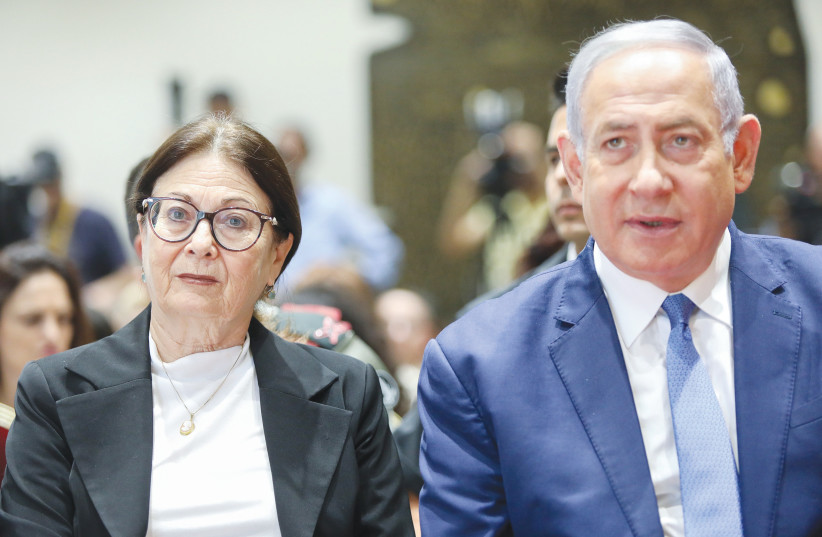The High Court of Justice rejected on Tuesday a request to postpone the reasonableness standard law hearing scheduled for September 12 by at least three weeks, but said that it would delay respondents’ argument filing and consider allowing the submission of additional arguments after the hearing.
Attorney for the government Ilan Bombach, Prime Minister Benjamin Netanyahu, and Justice Minister Yariv Levin had asked for more time to prepare for the hearing, but the High Court said that it was not possible to postpone the hearing because of calendar constraints.
September and October are filled with High Holy Days, and the court goes on an eight-day recess for Sukkot. The court’s schedule also faces the challenge of Supreme Court President Esther Hayut and Justice Anat Baron’s retirements in mid-October. The court had also said that the inability to shift the date was also due to the expanded bench of all 15 justices.
The court acquiesced to Bombach’s request for a delay on the date he was required to submit responses to the petitions calling for the striking of the basic law amendment, moving the date from September 3 to 9. The Attorney-General’s Office would still need to file its opinion on September 3. The petitioner’s main arguments would need to be filed on September 10, rescheduled from September 7.
High Court moved up meeting for attorney's son's wedding
While the date of the hearing would not be delayed, the High Court decided to move up the time of the meeting to two hours earlier, from 10:00 to 8:00. The court changed the time in response to Bombach’s concerns that he would have to reschedule his son’s wedding, which was set for later that evening. If there was no change of date, he had requested that the hearing be scheduled for the earliest time possible.

Religious Zionist Party MK Simcha Rothman attacked the decision not to postpone the hearing, noting that it came on the heels of last Sunday’s decision to reject a petition by the Lavi NGO calling for Hayut to be removed from the case for alleged bias.
“I wanted with all my heart to believe that the High Court is not deliberately striving to create a constitutional crisis as part of the war to preserve its excessive power and at the cost of dragging the State of Israel into functional chaos,” said Rothman. “Reality proves that this is a completely naive thought. The High Court has no boundaries. And in a democracy, there must not be an authority whose powers have no limits.”
The reasonableness law is an amendment to Basic Law: The Judiciary, and while the High Court has never before struck down a Basic Law amendment, many of the justices believe that they have this power. This is hotly contested because basic laws have quasi-constitutional status. If the High Court strikes down the law, and the government rejects the decision, it could result in a constitutional crisis.
Bombach had made the requests for a hearing and filing delay because the Attorney-General’s Office had only officially decided on Tuesday that he would not be representing his clients due to conflicting perspectives on the basic law amendment, and he didn’t have enough time to properly address all of the petitions. There are eight petitions against the reasonableness law, with hundreds of pages and a variety of arguments that he has to properly address, he argued. The extreme sensitivity and historic importance of the hearing demanded that the process not be rushed.
In a separate ruling on Tuesday morning, the High Court announced that they would not be accepting more petitions or amicus curiae. The court has accepted two “friends of the court” requests, experts that can provide additional context and information that help better understand the case. Those filing amicus briefs will include the Association for Civil Rights in Israel and 37 other human rights organizations, and the Israel Union for Environmental Defense.
There were 10 groups and people that had applied to be amicus curiae, including right-wing NGOs Im Tirzu and Lavi. Rothman also attacked this decision on social media, writing that the court rejected the applications of “parties supporting the reform of the judicial system and approved the opponents.”
In a third ruling, the court determined that one of the eight petitioners, who had requested to remain anonymous, had to reveal their details or offer an alternative petitioner. Maj.-Gen. Roni Numa was announced as the replacement petitioner soon after. The petition pertains to concerns that the new law and changes to the judicial system could lead international legal forums like the International Criminal Court to believe it had jurisdiction over Israeli security personnel. Under the principle of complementarity, international tribunals defer to local courts if they are independent.
“I submitted the petition out of concern for the safety of my subordinates, my friends, and commanders, the members of the security forces – the IDF, the Shin Bet, the Mossad, and the police,” said Numa. “I am convinced that when the members of the coalition voted to amend the law, they did not take into account the risk it poses to us fighters and to everyone who is at the core of security operations. Challenging the status and independence of the judicial and investigative system in Israel will significantly increase the risk of the international legal system interfering in what is going on in Israel, thereby endangering and exposing the security forces’ officers to criminal legal proceedings outside Israel.”
